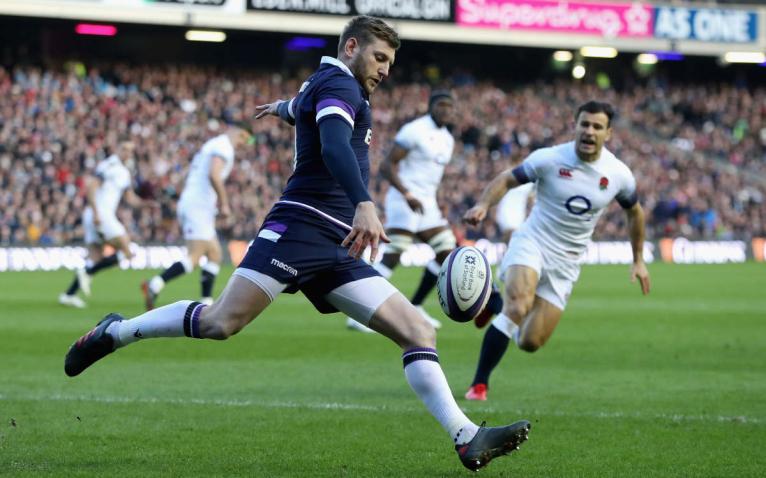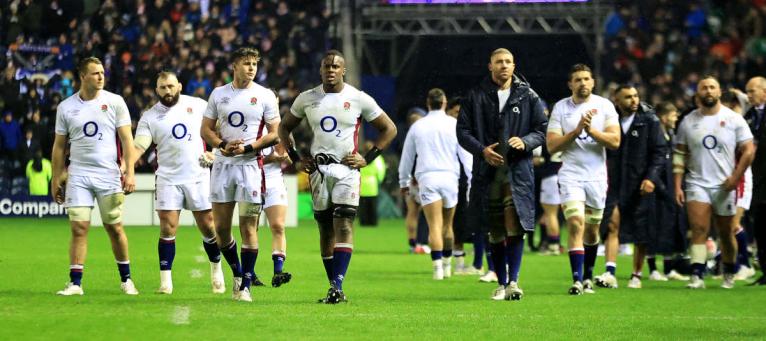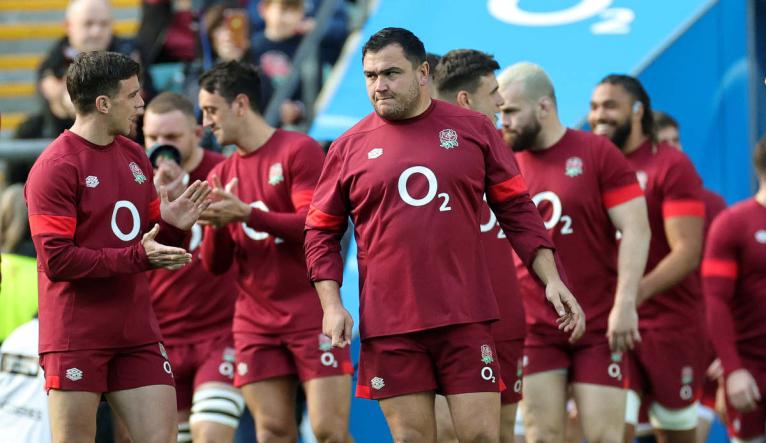It doesn’t pay to tip-toe into Murrayfield, although it didn’t do David Sole’s mob too much harm all those years ago when the Scotland captain did his funereal walk to the middle, rousing the crowd to a frenzy as they railed against English arrogance and Maggie’s Poll Tax. No wonder England sank to the turf at the final whistle as the Scots celebrated their unheralded Slam. Former England lock, Paul Ackford, was due to pen his first ever live column for ‘The Observer’, disdaining the use of a ghost writer (yours truly), the means by which virtually every piece you read with a player’s name on it makes its way into print. I saw Ackford collapse with frustrated anguish and figured that he’d never be able to cobble together anything so made contingency plans. In fact, he filed a pitch-perfect piece which began ‘I’m writing this as the England team bus leaves Murrayfield and it ain’t easy.’
No, it wasn’t. And it won’t be again. You need more than a tug on the emotional heart-strings these days to get results. Today, it’s about being smart and assessing the data. A different types of boldness. Hence the surprise shuffle of personnel in England’s back-field with the supposedly ever-reliable, (almost) ever-present master-of-the-skies, Freddie Steward, jettisoned from the match-day 23 in favour of the more creatively-endowed George Furbank. Elliot Daly clings on (where Steward might have slotted in if needed to) while Ollie Lawrence brings heft, and no little craft, to the midfield.
England realise that they will not prosper by rearguard high-ball catching actions alone. They can’t go down without having a craic. That’s a positive development, a ballsy selection decision that would have been beyond the scope of Steve Borthwick 12 months ago. Mind you, a benign (if such a thing exists north of the border) weather forecast helps. It’s possible to see the influence already of Felix Jones on Borthwick, providing just the sort of sounding-board assistance he was hired for. Furbank has niftier feet than Steward on the go-forward and, tellingly also, he will be able to better defend that outside ‘scramble’ channel if Finn Russell does his expected stuff and gets the ball wide and round the English blitz defence. Russell’s battery of kick-passes might also be better dealt with by a more nimble defender.

Furbank is a more rounded, more grounded, more aware player than he was when suffering on his debut against France in Paris in 2020. There’s more bite to his tackling, more poundage in his frame, more toughness in his head space. The 27 year old will need all of those qualities to come to the fore. This is a calculated selection, a gamble in the eyes of some, maybe many, but logical to the inner sanctum.
England needed more speed in both defence as well as attack, more wallop, too. George Martin is on the bench. Personally, I would have started with him on the blindside. Tough on Ethan Roots but Martin can mix it with the best and if England are to put the squeeze on Finn Russell (as has been the intended tactic for almost any no.10 worth his salt since time immemorial), then they need to be across the gain-line as often as possible.
Jim Telfer, as ever, was a lone voice of reason when he was asked about so-called English ‘arrogance’ at expecting to win all those years ago. ‘Quite right,” said the no-nonsense coach. “Nine times out of ten England should expect to beat Scotland.”
There may not be as much in tangible terms on the line this Saturday in Edinburgh but the match is freighted with a ton of significance for both teams. Scotland do not go into it in quite the invincible form that England had on their side back in 1990 but even so they should expect to win. They are settled, proven, if occasionally flaky, spurred by hurt, too, after the was-it, wasn’t it, TMO fiasco of a fortnight ago (BTW – was Tony Stanger’s try properly grounded in 1990? Oh, yes, no TMO, no endless faffing and a famous win quite rightly stands), primed to show that they are deserving of proper consideration as a team that could yet go to Dublin on the final weekend to put paid to historic notions of a back-to-back Irish Slam. That’s what Saturday means to them, affirmation that they can deliver when expectation comes knocking, that they can transcend that infuriating tag of not yet being consistent enough to be guaranteed a place on the top-table list of privileged members.
That’s why England have to do a Sole-type number on Scotland, somehow, anyhow. The form book would have the hosts at 7-10 point favourites, perhaps more. That never used to be the case but it most certainly is these days. Jim Telfer, as ever, was a lone voice of reason when he was asked about so-called English ‘arrogance’ at expecting to win all those years ago. ‘Quite right,” said the no-nonsense coach. “Nine times out of ten England should expect to beat Scotland.”

No more. And that is a reflection of the relative status of the teams with Scotland on a run of three successive Calcutta Cup triumphs. England have only won once in their last six outings against Scotland. An English victory would have to be put into the context of that dismal record. It would be an almighty achievement, cause enough to declare already that this championship has been a relative success with Ireland and France to come.
England do share with Ireland the status of being unbeaten while Scotland have had a topsy-turvy output, playing likes Gods and then like drains against Wales and then railing against natural justice versus France when, in truth, they ought to have made sure of victory before those agonising closing moments.
The leaders will need to be leaders, and it is credit to Jamie George that has managed to bring about a sense of the collective in a short space of time.
The more reliable barometer of England’s standing is their meagre +5 point differential. But credit where it is due, they travel north with a rugged, dogged feel about them, a bit of snarl and resilience, a bonded commitment and an ability to get across the finishing line with their noses in front. If you feel that these are little more than the basic requirements of an international team then you would be right. But, at least, they are present and correct in that regard. There had been too many occasions in the Eddie Jones’ dog days, even the early days of Steve Borthwick, when they have not been.
Quite why England have publicly named three vice-captains is an irritating and probably inconsequential development, an affectation akin to Eddie Jones’ meddling, mangling the adequate ‘replacement’ terminology into ‘Finishers.’ The players are no fools, lest coaches do not realise that. They would defer to Ellis Genge, Maro Itoje and George Ford on the field no matter what is in brackets after their name. The leaders will need to be leaders, and it is credit to Jamie George that has managed to bring about a sense of the collective in a short space of time.

Genge might lack Joe Marler’s set-piece steadiness but he adds to the ball-carrying. So much rests on England’s ability to get-up-and-at-‘em, to hone and execute their intended blitz. But they also have to fire a few shots of their own as the Russell armoury is fully-stocked. England, at the very least, have made their intentions clear. The meek rarely inherit rugby’s earth. On such calls are head coaches judged.


The articles headline picture. The look on George Ford’s face - must have been thinking about that charge down kick.
so is England going down or not going down on Scotland?
Has he some names from rugbypass papers ? 🤣
Do you mean that “England can’t go down without having fun” or “England can’t go down without having a go at Scotland”?
Exactly!! “Craic” isn’t what Mick or the editors think it is. It would be great though if Borthwick used that in the event of a loss… “well, we lost, but we had some craic at least”.